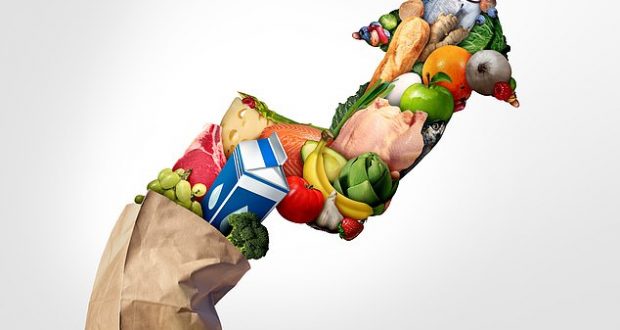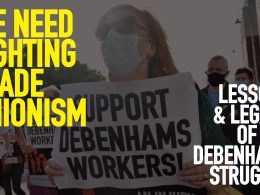By Dan O’Rourke
The rising cost of living, which has seen household bills skyrocket, looks set to last well into 2022 and beyond according to many economists. A figure of 5.7% inflation is being reported for Ireland, translating to an extra €3,000 to €4,000 per household compared to last year. This means that if you do not receive a pay rise at or above the rate of inflation you are effectively getting a pay cut.
For those already struggling to make ends meet, the consequences could mean debt, destitution, or eviction. According to recent CSO figures, one-fifth of the population is at risk of poverty. This is particularly stark given that the only thing not set to increase is wages.
Capitalist contradictions
According to pro-capitalist economic textbooks, inflation occurs in part when the economy is growing and rising wages for workers drives up the cost of goods and services, the so-called ‘wage price spiral’ of a feedback effect in which capitalists keep raising prices in step with wages. But this explanation is untrue in general and certainly inflation in 2022 is not a textbook example. Wages have been stagnant for years.
Wage rises achieved by workers, whether through struggle or because labour shortages force the bosses in some sectors to raise wages to attract and retain workers, do not directly lead to a rise in the cost of goods or services. Assuming all the other inputs going into making a particular good or service; raw materials, energy, machinery depreciation and replacement remain constant, then rising wages simply result in smaller profits for the capitalists who still have to compete with each other in the market and cannot arbitrarily increase their prices to make good on the increased wages they have to pay out.
Capitalism is hitting a brick wall of contradictions, namely that it requires high-paid consumers and low-paid workers in order to run smoothly. But it doesn’t take an economist to understand that you can’t have both at the same time.
The real impact on the low paid
Economists now point to abstract supply and demand causes (increased demand as the economy opens up, and restricted supply as production and distribution are slow to respond), but this is all rooted in the greed and chaos of capitalism, specifically, it’s inability to plan for shortages and deadlocks, and it’s need to increase profit before all else.
Natural gas shortages, supply chain deadlocks; and corporations using these as cover to increase profits, will see many people really struggle, especially those on lower incomes. As food activist Jack Monroe recently explained in a viral Twitter thread, inflation figures are inaccurate for those on lower incomes, and fail to capture the actual increase in the cost of living.
Supply chain chaos
Christine Lagard, head of the ECB expects supply chain knots, a key contributor to inflation, to be untied in coming months. A prediction that flies in the face of reality as the supply chain crisis isn’t over and could stretch beyond 2023.
When lockdowns swept the world, production of non-essential goods ground to a halt. Particularly in Asia. This also meant that transport and distribution networks became stuck. Shipping containers, essential to the movement and production of almost all goods, were stored in the cheapest locations rather than the most rational or efficient.
Predictably, as soon as production leapt back into motion, factories found containers were hard to come-by. This proved to be a boon to the monopolistic shipping industry which is using the surge in demand, and low supply of containers, to drastically increase their profits. A lack of forward planning in production and distribution means that tangled supply chains are inflating the cost of living.
Corporate greed and increasing profit margins
While international corporations have been outwardly blaming the supply chain crisis for their rising prices, they are telling their shareholders a different story and bragging about their “pricing power in the market”.
CEO of Campbell’s Soup, Mark Claus, recently reassured shareholders that their swollen profit margins will help them through this inflation storm. Car manufacturers, hit by lack of microchips, are pledging to keep prices high once the supply issue is resolved.
Profits of US-based non-financial corporations are hitting unprecedented peaks. For every person in the U.S., corporations used to make about $3,081, but today make about $5,207. An increase of $2,126.
Minimum wage increase linked to inflation needed now
The inflation we’re seeing can’t be blamed on wage increases, and unions should strenuously rebuff all such arguments as they now move to fight for wage rises across the board. This should begin with demanding action in favour of those already suffering from heinously low wages, especially those on the minimum wage.
Socialist Party TD Mick Barry is proposing a motion in the Daíl rebuking the Government’s decision to raise the minimum wage by a mere 2.9% given that the inflation rate is nearly double that. The motion calls for an emergency review and a new rate by 1 May which fully compensates for price hikes and is index-linked. In the Dáil debate Mick Barry TD will argue for a minimum €15 an hour rate. This is not just about the low paid – we want wage rises for all workers, but raising the “floor” is a starting point and will have a knock-on effect for all workers.
Connected with this is the urgent need for workers and unions to organise to defend their living standards from the ravages of inflation. In Turkey this month, where inflation is as high as 80%, thousands of delivery drivers at ecommerce company Trendyol won a 39% wage increase after a three-day wildcat strike, rejecting an initial 11% increase. This has inspired other logistics workers, and the transport union ‘All Transport Workers’ Union (TÜMTİS)’ are demanding a 50% increase for their members. This example shows the way forward for unions and workers in Ireland.












